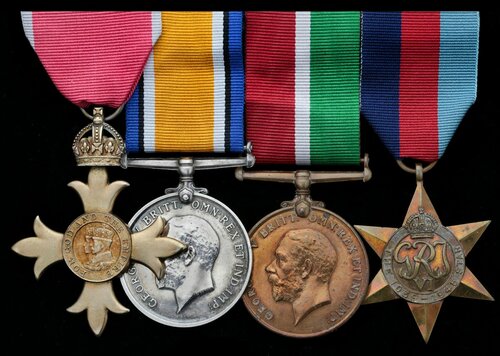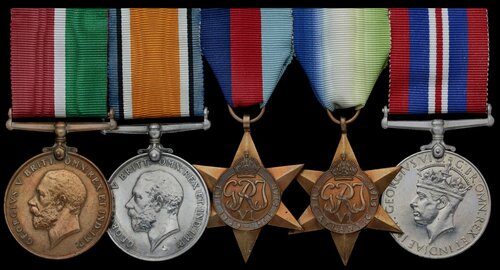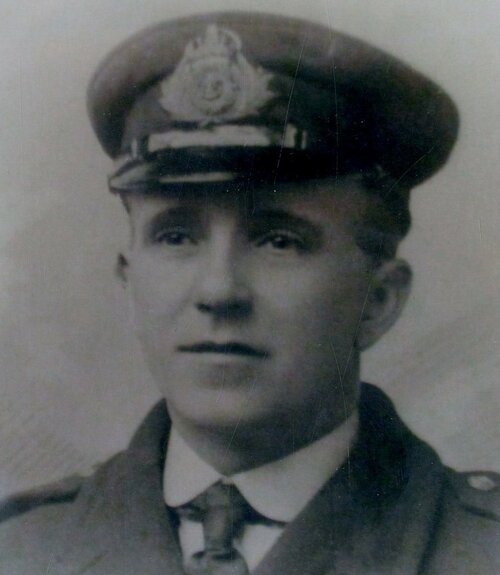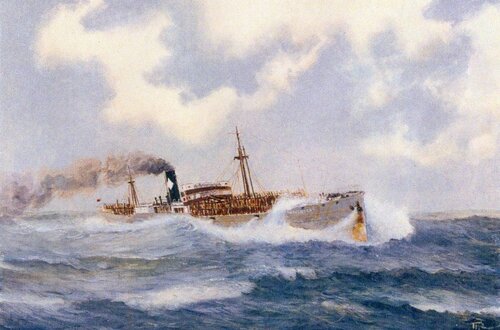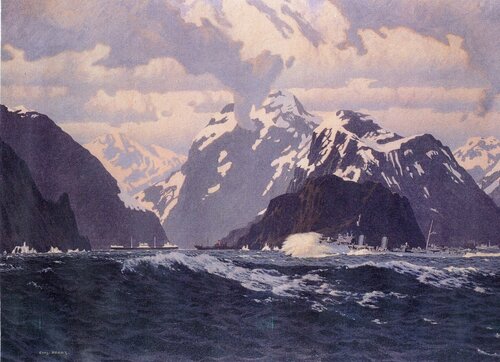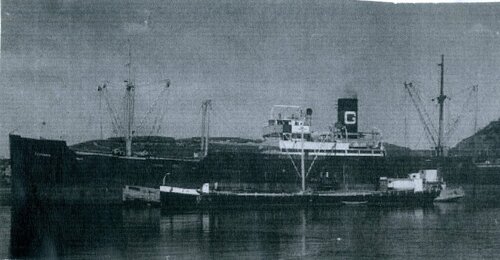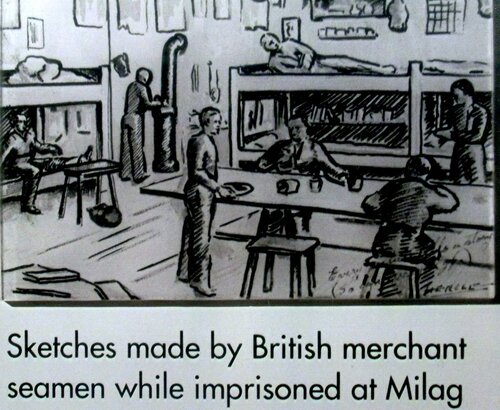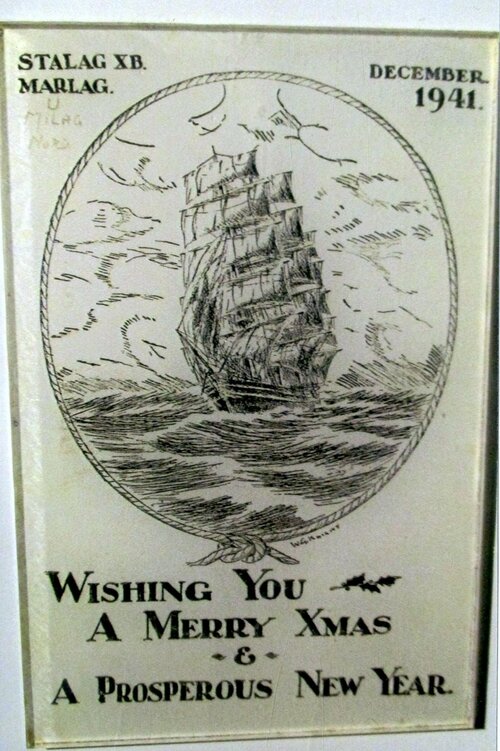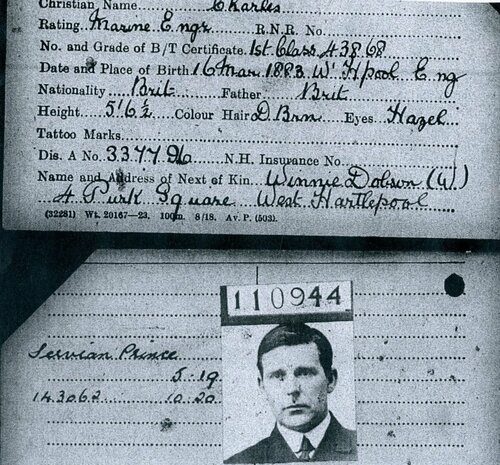Auction: 21003 - Orders, Decorations and Medals
Lot: 474
Family Group:
Five: Chief Engineer G. T. Dobson, Merchant Navy, killed on 28 January 1941 in the loss of the Grelrosa
Mercantile Marine and War Medals, mounted in that order (George T. Dobson); 1939-45 Star; Atlantic Star; War Medal 1939-45, mounted as worn, first two polished and pitted, overall very fine
A 1945 Gothenburg Convoy O.B.E. group of four awarded to Chief Engineer C. Dobson, Merchant Navy, who was interned during the fall of Norway and again after the failure of the second Gothenburg Convoy having volunteered to serve with it despite being in his sixties
The Most Excellent Order of the British Empire, Civil Division, Officer's breast Badge, silver-gilt, British War and Mercantile Marine Medals (Charles Dobson); 1939-45 Star, mounted as worn, first two slightly polished, very fine (9)
George Thomas Dobson was born at Johnson Street, Hartlepool, on 17 December 1875, the son of Charles Dobson Senior. Serving in the Merchant Navy prior to the war he married Bessie Evelyn Bidduplh at Hartlepool, Durham. He was still with the Merchant Navy as an Engineer Class I during the Great War and is reported to have seen anti-submarine service. By 1919 he was serving aboard the S.S. Whateley Hall and by 1921 the S.S. Hubbestone, it was around this time that he moved to Cardiff with his wife were he lived for the remainder of his life. Promoted to Chief Engineer in 1939 he served with the S.S. Grelrosa prior to the war. Remaining with this as the war progressed he was present aboard on 28 January 1941 when lagged behind her convoy and was bombed by a German Kondor aircraft. The Grelrosa sank 400 miles west of Malin Head and Dobson was killed. He is remembered on the Merchant Navy Memorial, Tower Hill; sold together with the original commemorative scroll sent to his widow, in its original envelope, and a research file containing copied research on the recipient and his brother including photographs of both the recipient himself and the ships he served aboard, newspaper articles on his exploits and M.I.C. entries, along with census information.
O.B.E. London Gazette 16 October 1945.
Charles Dobson was born on 16 March 1883 at Hartlepool, Durham, the son of Charles Dobson Senior. He was married in Hartlepool to Winnifred Hobbin before the war. Also serving in the Merchant Navy he was Chief Engineer during the Great War serving aboard S.S. War Jackdaw in July 1918.
Like his brother Dobson remained in the Merchant Navy into the Second World War and on 9 April 1940 he was aboard the S.S. Romanby as it loaded Iron Ore in Narvik, Norway. An account from his diary quoted in the Liverpool Echo, 1 May 1940, states:
'April 9 - Just going to load at 5 a.m. German destroyers entered harbour. Three additional German destroyers landed troops. Took charge of harbour. Came swarming aboard our five ships.
We were all lined up on deck, arrested and taken ashore about five o'clock that afternoon to a school. Slept on floor without blankets.
April 10.- About 5 p.m. five British destroyers entered the port, and a great naval battle took place, Several Merchant ships which the Germans had anchored in front of their destroyers as protection were blown out of the water by the British destroyers
Two German Destroyers were sunk. Our ships was sent to the bottom as well as the other four merchant ships. That day we were moved from the school to Iris Cafe, right on the waterfront. German marines were put in charge of us.'
His account continues noting air raids on 12-13 April resulting in three German destroyers sunk as well as a bombardment of the shore by British ships. It was decided to inter the British crews in Sweden and on 23 April, Dobson was one of those who endured a 36 mile march through a blizzard to their place of confinement. Despite being in his sixties at the time Dobson survived to be repatriated, although he did suffer from frostbite to both his hands and feet. He continued to operate in the Baltic despite this experience and was one of the crewmen at Gothenburg in March 1942 who volunteered to bring a convoy of merchant vessels to Britain. There odds were slim and the convoy were intercepted by German Warships. The official report states:
'The "Gudvang made a very spirited attempt to break out from the Skagerrak and was sailing for 22 hours before she was overhauled and forced to blow herself up'
Dobson had volunteered to serve as Chief Engineer aboard the S.S. Gudvang and was again interned. The official report does credit to his bravery, stating:
'Mr. Dobson gave particularly helpful and exemplary service. In spite of being an elderly man he gladly assumed responsibility in this hazardous operation, the risks of which he fully appreciated. All these Officers volunteered to run the enemy blockade knowing that the enemy were fully aware of the proposed operation and had, in view of the success of a previous similar operation, taken exceptional counter measures. Although the ships were unsuccessful in running the blockade, it was due to the determination and co-operation of these Officers that the ships were prevented from falling into the hands of the enemy.'
Their situation was not improved by the captains of several of the ships including the Gudvang scuttling their charges to prevent the resources falling into German hands. Taken to Camp Milag, Bremen, not all of Dobson's compatriots were able to last the rough conditions with his skipper, Captain Nicholson dying of disease. They were liberated in May 1944 by an elements of the Welsh and Scots Guards. Returning to Hartlepool Dobson lived at 170 Durham Street, West Hartlepool. He was visiting his son on 27 February 1948 at 5 Welldeck Gardens, Hartlepool, when he suffered a heart attack and died; Sold together with a research file containing copied research on the recipient and his brother including photographs of the recipient himself and the ships he served aboard, newspaper headlines relating to his two internments, a London Gazette entry along with census information and extracts from The Red Duster at War and the report on the Gothenburg voyage.
Subject to 20% VAT on Buyer’s Premium. For more information please view Terms and Conditions for Buyers.
Sold for
£420
Starting price
£480

